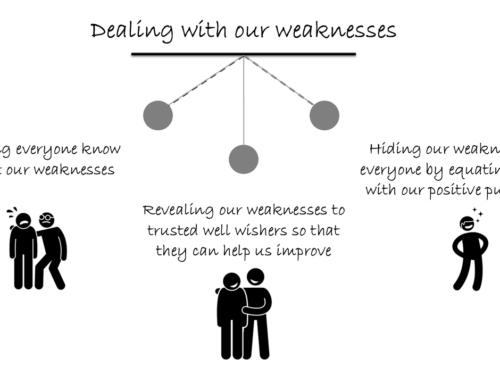Suppose someone we work with lies to us frequently. They claim that they can do things they can’t do. Or they claim that they can’t do things they can do. If we are repeatedly misled by them, we will eventually deem them unreliable and seek a replacement for them.
Won’t something similar happen if we lie to ourselves? Suppose we need to follow a strict regimen to improve our health. Suppose further we don’t follow it because we are too lazy, but claim to not follow it because we are too weak. By such lying, we will undermine not just our health, but also our trustworthiness, in our own eyes. .
What makes lying to ourselves further dangerous is that we humans are psychologically vulnerable to manipulation by repetition. Joseph Goebbels, Hitler’s propaganda minister, put it well, ““If you tell a lie big enough and keep repeating it, people will eventually come to believe it.” When exposed to our repeated lies, our intelligence will weaken; we won’t even know when we are lying and when we aren’t. Eventually, we will end up believing our own lies. Pertinently, the Bhagavad-gita (03.06) underscores the danger of pretending: we are deceiving not just others but ourselves too.
Being unable to rely on ourselves is far more crippling than being unable to rely on others. Why? Because we can replace others, not ourselves. We are our first and indispensable resource for doing anything, including even consulting others.
How can we make ourselves more reliable for ourselves? By conscientiously striving to be honest with ourselves. What if we still lie to ourselves because of habit? We can make time for regular introspection, wherein we evaluate our self-talk. When we thus confess to ourselves, we strengthen and sharpen our intelligence, thereby creating the foundation for reforming ourselves.
One-sentence summary:
If we lie to ourselves, we can’t rely on ourselves; self-confession is foundational for self-transformation.
Think it over:
- How are we vulnerable to manipulation by repetition?
- Why is lying to ourselves especially damaging?
- What lies do you tell yourself frequently? How can you counter them?
***
03.06: One who restrains the senses of action but whose mind dwells on sense objects certainly deludes himself and is called a pretender.
To know more about this verse, please click on the image
Explanation of article:

Podcast:



Leave A Comment